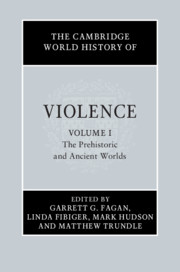53 results
3 - The Federalist and the Founders
- from Part I - The Emergence of the American Essay (1710–1865)
-
-
- Book:
- The Cambridge History of the American Essay
- Published online:
- 28 March 2024
- Print publication:
- 14 December 2023, pp 46-60
-
- Chapter
- Export citation
Chapter 2 - The Law of Form and the Form of the Law
- from Part I - Form and Genre
-
-
- Book:
- American Literature in Transition, 1770–1828
- Published online:
- 09 June 2022
- Print publication:
- 23 June 2022, pp 19-33
-
- Chapter
- Export citation
Principles for Safe Implementation of ICD Codes for Human Trafficking
-
- Journal:
- Journal of Law, Medicine & Ethics / Volume 49 / Issue 2 / Summer 2021
- Published online by Cambridge University Press:
- 29 June 2021, pp. 285-289
- Print publication:
- Summer 2021
-
- Article
- Export citation
Maps
-
- Book:
- The Cambridge World History of Violence
- Published online:
- 13 March 2020
- Print publication:
- 26 March 2020, pp xiv-xiv
-
- Chapter
- Export citation
Part II - Prehistoric and Ancient Warfare
-
- Book:
- The Cambridge World History of Violence
- Published online:
- 13 March 2020
- Print publication:
- 26 March 2020, pp 179-296
-
- Chapter
- Export citation
Part III - Intimate and Collective Violence
-
- Book:
- The Cambridge World History of Violence
- Published online:
- 13 March 2020
- Print publication:
- 26 March 2020, pp 297-438
-
- Chapter
- Export citation
Part IV - Religion, Ritual and Violence
-
- Book:
- The Cambridge World History of Violence
- Published online:
- 13 March 2020
- Print publication:
- 26 March 2020, pp 439-530
-
- Chapter
- Export citation
Part VI - Representations and Constructions of Violence
-
- Book:
- The Cambridge World History of Violence
- Published online:
- 13 March 2020
- Print publication:
- 26 March 2020, pp 587-703
-
- Chapter
- Export citation
Copyright page
-
- Book:
- The Cambridge World History of Violence
- Published online:
- 13 March 2020
- Print publication:
- 26 March 2020, pp vi-vi
-
- Chapter
- Export citation
Part I - The Origins of Conflict
-
- Book:
- The Cambridge World History of Violence
- Published online:
- 13 March 2020
- Print publication:
- 26 March 2020, pp 37-178
-
- Chapter
- Export citation
Figures
-
- Book:
- The Cambridge World History of Violence
- Published online:
- 13 March 2020
- Print publication:
- 26 March 2020, pp xi-xiii
-
- Chapter
- Export citation
Contents
-
- Book:
- The Cambridge World History of Violence
- Published online:
- 13 March 2020
- Print publication:
- 26 March 2020, pp vii-x
-
- Chapter
- Export citation
Contributors to Volume i
-
- Book:
- The Cambridge World History of Violence
- Published online:
- 13 March 2020
- Print publication:
- 26 March 2020, pp xv-xviii
-
- Chapter
- Export citation
Part V - Violence, Crime and the State
-
- Book:
- The Cambridge World History of Violence
- Published online:
- 13 March 2020
- Print publication:
- 26 March 2020, pp 531-586
-
- Chapter
- Export citation
Index
-
- Book:
- The Cambridge World History of Violence
- Published online:
- 13 March 2020
- Print publication:
- 26 March 2020, pp 704-740
-
- Chapter
- Export citation

The Cambridge World History of Violence
-
- Published online:
- 13 March 2020
- Print publication:
- 26 March 2020
Part III - Coordinates
-
- Book:
- The Cambridge Companion to Narrative Theory
- Published online:
- 19 October 2018
- Print publication:
- 01 November 2018, pp 151-261
-
- Chapter
- Export citation
Index
-
- Book:
- The Cambridge Companion to Narrative Theory
- Published online:
- 19 October 2018
- Print publication:
- 01 November 2018, pp 269-277
-
- Chapter
- Export citation
Further Reading
-
- Book:
- The Cambridge Companion to Narrative Theory
- Published online:
- 19 October 2018
- Print publication:
- 01 November 2018, pp 262-268
-
- Chapter
- Export citation
Copyright page
-
- Book:
- The Cambridge Companion to Narrative Theory
- Published online:
- 19 October 2018
- Print publication:
- 01 November 2018, pp iv-iv
-
- Chapter
- Export citation



